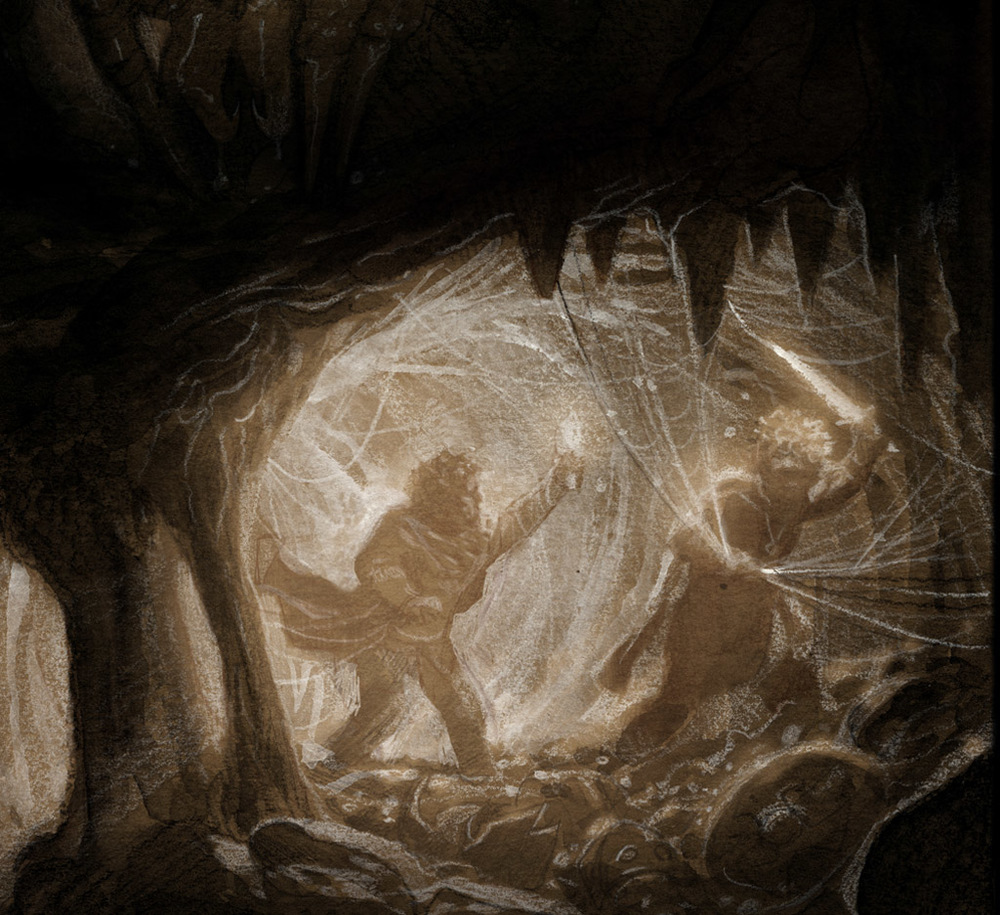I gave a talk before a reading at Nashville’s St. Paul Christian Academy last week. This is a version of that talk. That picture to the left, by the way, is by Justin Gerard, one of my favorite illustrators. Here’s a link to his blog posts about his illustrations of The Hobbit.
Of all the characters in The Lord of the Rings, the hobbits seem the least qualified to deliver the Ring to Mordor. We love the fact that they do. The very pedestian muggles who raise Harry Potter believe he’ll never amount to anything, yet he is the object of hope and wonder in the much more wonderful world of the wizards.
Why do we so love stories of unlikely heroes? I think it’s because they’re the truest stories. In our story, the Hero is a most unlikely one: the King of the Universe was born not in a palace but in stable. His birth was announced not to the movers and shakers, but to shepherds on a hillside. He grew up in Galilee, a region so rural and backwards that people used to say, “Can any good thing come out of Galilee?” When he grew up, he didn’t have a home or a steady job. He hung out with laborers and tax collectors and losers and misfits of every stripe. And when his time had come, he conquered death through a most unlikely means: he died the shameful death of the cross and rose again from the dead.
Yes, Jesus was the most unlikely of heroes–and the only sort of hero who could rescue a human race that was hell-bent on its own destruction. There is an upside-downness to our story that requires upside-down solutions.
When the gospel began to spread, it didn’t spread rightside-up but upside-down–not through the powerful and the influential, but through twelve poorly educated sons of toil, some of whom, like Peter, were of questionable reliability. The gospel that began by paradox conquered the world by paradox.
I love what Paul told the Corinthians:
Consider your calling, brethren, that there were not many wise according to the flesh, not many mighty, not many noble; but God has chosen the foolish things of the world to shame the wise, and God has chosen the weak things of the world to shame the strong.
Which is another way of saying that, in the end, the real heroes turn out to be the unlikely heroes. We look at ourselves and say “I don’t bring much to this situation,” but God says, “No, no, no; I use the weak things of the world to shame the mighty, and the foolish things of the world to shame the wise.” We say, “We feel like orphans,” but God says, “No, no, no; you are sons and daughters of the Most High.”
To paraphrase Chesterton, when you’re born upside down, it’s hard to know when you turn rightside up. We aren’t born knowing who we are. We have to be told.
The Charlatan’s Boy grew out of a single sentence, which now, in its published state, is still the first sentence of the book: “I don’t remember one thing about the day I was born.” None of us really knows how we got here–only what somebody told us. We depend on others to tell us, “Here’s who you really are.” A name is something that has to be given us.
The Charlatan’s Boy tells the story of Grady, an unusually ugly orphan boy who has never had anyone who could give him a name. He believes himself to be not only unloved, but unloveable. He was born upside down. The biggest difference between Grady and us, perhaps, is that he is inescapably and constantly aware of his upside-downness. There’s something heroic in his unflagging quest to get rightside-up again. He’s an unlikely hero, yes–but what other kind of hero is there?









Catharine
Jonathan – This post is so on target. Thank you Thank you for highlighting the roots of heros. So many come as the underdog. Our precious saviour, for all His grandeur, choose to enter the world as a baby, a poor baby, in the humblest of places. I stand amazed.
Catharine
Caites-whispertothewind.blogspot.com
Scott
I like those underdog heroes in part because it gives hope of significance in my own life. Maybe boring old Scott could someday discover something wonderful that would lead him on adventures.
And I would argue Jesus did have a home, and that it was in Capernaum (Mark 2:1-2).
Jonathan Rogers
You may be right, Scott, about Jesus having a home in Capernaum. I was referring, however, to the time he said, “Foxes have holes, birds have their nests, but the Son of Man has nowhere to lay his head.”
Patrick
Most heroes do seem to be the underdogs. I we think want stories to be that way, because those stories give us hope regarding our own role in the drama of the universe. In “Horton Hears a Who” by Dr. Seuss it is the smallest of those less than microscopic Whos who makes the difference. We want to believe that even “little old me” can make a difference in the world…
But we come into this world not knowing who we are… boys wear blue, girls wear pink; boys don’t cry, girls don’t fight; we’re all too ugly, fat, and stupid, but for $19.99 you can get a free Ginsu knife and the latest book of lies to tell you how to fix all of those problems… and then throw on top of what the world says we are or should be these facts:
Here in the Good Old US of America 1 out of every 4 girls, and one out of every 6 boys, will be sexually abused before they reach the age of 18 years old.
Sexual Abuse only represents 7.6 percent of all child abuse in this country.
Over 90% of abuses are inflicted on children by their parents.
About 5 children die everyday as a result of child abuse.
And the nation in general tries to pretend these things don’t really happen. Our social services are some of the most under-paid/over-worked people in the country. Funding for treatment of abused children continues to decline. Americans would rather throw their money at rescuing abused monkeys. To give their money to help fight Child Abuse would mean acknowledging these real and painful facts are true.
I hear all too often Christians warning about the dangers of pride. Some go as far as to rally against Psychological Counseling attempting to promote Self-Esteem, Self-Efficacy, Self-Worth to transform victims into survivors and over comers. Self valuing is considered evil, So instead we have a bunch of worthless Christians sitting around doing NOTHING. God gave the first man and woman free-will and a choice when he created them, and they were held responsible for their choices, just as we will be held responsible for ours. One devoid of power can not be held responsible. Believing we have power and responsibility over our own lives is a GOOD thing. And the very thing that is stripped away when children get abused- and grow up to be adults who feel powerless and don’t take any responsibility over their lives- because they don’t know they can. Self pride is not near as common nor as dangerous as the feeling of being worthless and powerless.
God can use anyone at all. But He Won’t. God will only use you offer what the power and responsibility that you have to him. God won’t take what you don’t give. God- your creator- respects the power and authority that you have over your life. He will not take it from us, but wants us to willingly give it over to him… so he can make his power and authority available to us.
We are precious valuable Children of God. To see ourselves as less is to believe the lies of the deceiver. We all are potential heroes. Will you take action using the gifts you’ve been given to let your voice be heard like the littlest Who? or will you silently sit in self pity wondering why God isn’t doing anything in your life?
The Hero of the World came to save us all. He holds out his nail scared hands to pull us out of the mire of sinful life… but you have to reach back and hold on.
Jonathan Rogers
I agree, Patrick, that it’s a good and healthy thing to feel that we have power and responsibility for our lives. And you’re right that abuse strips people of the understanding that they possess power and responsibility–perpetuating a whole new cycle of hurt and abuse. As for whether pride is less common or more common than feelings of worthlessness, I think it’s worth noting that the two aren’t really mutually exclusive. From a spiritual perspective, the only really useful definition of pride is the desire or inclination to sit on the throne that is God’s to sit on. And somehow we human creatures can manage to feel self-loathing and self-worship simultaneously. I have a friend who says, “I am the piece of [garbage] that the universe revolves around.”
Patrick
Sorry about all the typos and sounding kinda like a rant. I was in a hurry but wanted to contribute my perspective on the unlikely heroes to the discussion. I’ll be more intentional to proofread before hitting “Submit” next time.
Patrick
I guess you’re right. It doesn’t seem logical. Self-loathing should negate self-worship, but somehow it doesn’t. I’ve just thought of it as false pride- excessive boasting in what they think might be appealing to others as an attempt to conceal their true negative opinion of themselves. And there is a lot of genuine self-worshiping pride too… but to me more people seem to live in that helpless wounded condition with a smile on a plastic mask to hide their pains.
S.D. Smith
Great post, JR. This is very similar to my talk at Hutchmoot, so I’m assuming you just ripped me off. Maybe that’s why I like it so much. But I used Sam (from LOTR) and Smith (from Smith of Wootten Major) as my focus-points –and emphasized what a big deal I am. But you already know that.
Bravo for a well-said thing. Grady is awfully unlikely, and therefore easy to relate to for all of us ordinary people who are really extraordinary.
Good show, old chap.
sally apokedak
Great post. One of my favorite books is THE UPSIDE-DOWN KINGDOM.
The first will be last and the greatest will be the servant of all and God takes the form of a slave and is obedient unto death.
And Grady…I loved him in the first chapter as he longed to know who he was, but part of his loveliness is his kindness to Floyd even after Floyd abuses him. Also his joy in life, his love of doing a good job, his lack of bitterness or self-pity…. All of those are upside-down things in a world where most of us want to get our fair share and demand to be treated with respect, and they all made me love little Grady even more as the story as the progressed.
bamlelub
“Thank you Thank you for highlighting the roots of heros. So many come as the underdog. Our precious saviour, for all His grandeur, choose to enter the world as a baby, a poor baby, in the humblest of places. I stand amazed.”How much is real?